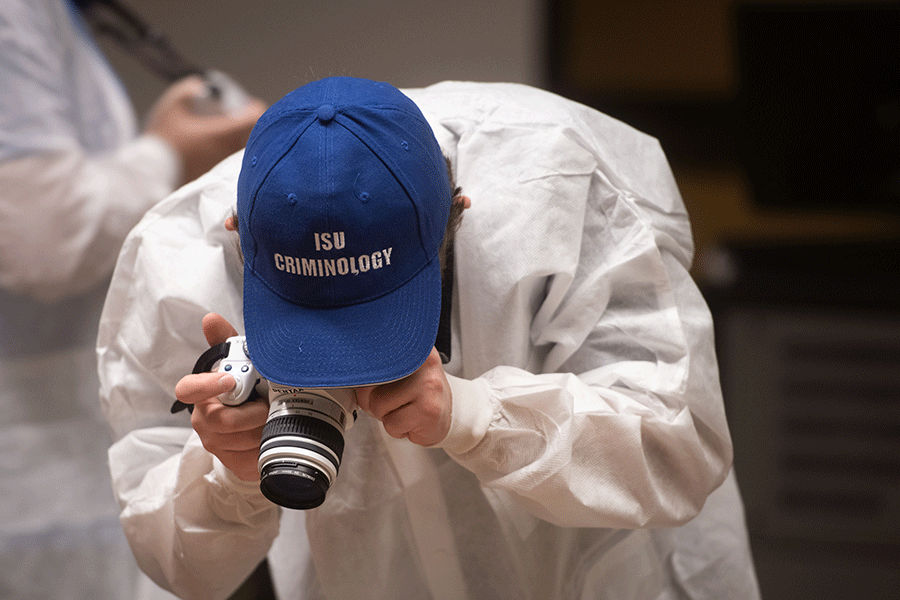Why Earn a Bachelor’s Degree in Intelligence Analysis at Indiana State?
The Intelligence Analysis BS at Indiana State delivers comprehensive instruction and significant hands-on preparation in critical thinking, research skills, and data analysis, preparing you for a career in national security, counterterrorism, and risk assessment. This program specifically highlights the continually evolving nature of intelligence analysis and emphasizes the use of new academic research into analytical methods.
Participate in Hands-On Learning
As an Intelligence Analyst major, you will participate in realistic, simulated, and field-based exercises designed to test and sharpen your analysis and assessment skills and techniques. Coursework involves the preparation of assessments based on the collection, correlation, and analysis of intelligence data.
Build Skills in our Cyber-Intel Lab
The Cyber/Intel Laboratory at Indiana State is a learning space for hands-on teaching and realistic simulations involving digital forensics, cybersecurity, and intelligence and behavioral analysis.
Equipped with the latest tools and technology – including an 85-inch Sony monitor and individual workstations with HP laptop computers, 32-inch LG monitors, and Gaming chairs – the Cyber/Intel Lab is a closed environment with limited access for faculty and a single Internet connection separated from the University’s main networks.
Learn more about our Cyber/Intel Lab
Learn from Our Excellent Faculty
Award-winning faculty in the School of Criminology & Security Studies bring decades of industry experience and expansive professional networks to their classroom instruction. They teach small classes in a collaborative style that emphasizes teamwork, active inquiry, and hands-on practice, in addition to traditional lectures. Most hold doctoral degrees and engage in research and scholarly activities. All are dedicated to your success.
Your instructors will assist you with professional development, including career paths, internships, undergraduate research opportunities, participation at professional conferences, and other issues related to your professional growth.
What You’ll Learn in the Intelligence Analysis Program
The Intelligence Analysis BS will help you develop the technical and critical-thinking skills necessary to anticipate, analyze, and counter actions and incidents adverse to the interests of the United States and its allies, its homeland and law-enforcement organizations, its communities and businesses, and its everyday citizens. This 51-credit undergraduate program may be completed in four years of full-time study.
This 51-credit program fosters a deep understanding of complex geopolitical issues and enhances your strategic decision-making abilities. It includes 30 hours of core classes, 15 hours in your chosen concentration, and six directed elective credits. There are four concentration options.
For the internship requirement (3 credits), you will engage in a minimum of 96 hours of employment as an intelligence analyst with a government agency, international agency, or corporation, during which certain experience objectives must be met.
Concentrations
Learn the techniques, technologies, and analytical tools that help protect intelligence data, personnel, and infrastructure.
Course topics include foreign intelligence organizations, threats and risk assessments, military intelligence, signals intelligence, cybercrime, and counterintelligence operations.
arrow_forward View required coursesLearn to collect, interpret, and analyze intelligence on criminal operations and organizations.
Course topics include crime analysis, criminal profiling, intelligence and narcotics, open-source intelligence, cybercrime, and geospatial technology.
arrow_forward View required coursesLearn the different types of intelligence, the tools and methods used to collect it, and how to plan, implement, direct, and participate in intelligence operations in support of government, military, and law enforcement objectives.
Course topics include tactical intelligence, counterintelligence, foreign intelligence organizations, signals intelligence, open-source intelligence, human intelligence, geospatial intelligence, and computer forensics.
Career Possibilities for Intelligence Analysis Majors
Graduates from the Intelligence Analysis degree program at Indiana State University will enter a growing and lucrative job market for intelligence, business, and security analysts, criminal and industry investigators, military intelligence officers and specialists, and related positions. Graduates are also prepared to pursue advanced degrees in intelligence analysis, criminal justice, and related fields.

Helping Others Through Intelligence Analysis
“My education at Indiana State has provided so many opportunities for me to learn about intelligence analysis and the industry I want to pursue. The smaller class sizes have allowed me to know my professors and fellow classmates. My classes gave me realistic scenarios, so I know how to react when I am in these situations in my career.”
Sycamore Payton Vallee didn’t know intelligence analysis was a discipline you could study in college. Now, the Sycamore junior is hard at work in the major, preparing for a career combating human trafficking using the power of data analysis, predictive modeling, and old-fashioned critical thinking.
Learn more about Payton’s Sycamore experience.Related Programs
-

Cybercriminology and Security Studies (BS)
Bachelor's
-

Criminology and Criminal Justice (BS)
Bachelor's
-

Information Technology (BS)
Bachelor's



